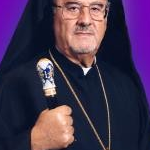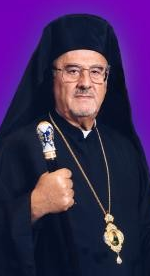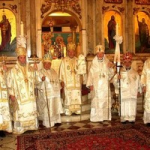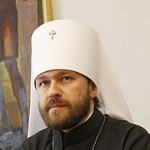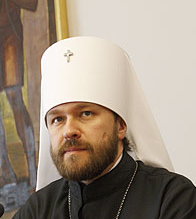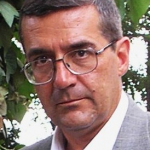Deprecated: trim(): Passing null to parameter #1 ($string) of type string is deprecated in
/home/aoiusa/public_html/wp-content/plugins/sexybookmarks/public.php on line
388
Deprecated: trim(): Passing null to parameter #1 ($string) of type string is deprecated in
/home/aoiusa/public_html/wp-content/plugins/sexybookmarks/public.php on line
394
Deprecated: trim(): Passing null to parameter #1 ($string) of type string is deprecated in
/home/aoiusa/public_html/wp-content/plugins/sexybookmarks/public.php on line
400
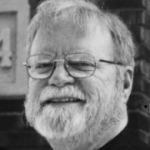
Fr. Patrick Henry Reardon
Source: Antiochian Archdiocese | Fr. Patrick Henry Reardon
During this past September 13-18, I was part of a delegation sent to Syria by Metropolitan PHILIP to investigate the internal political situation in that country, particularly with respect to its Christian minority. Our group consisted of six priests of the Antiochian Archdiocese: Fathers Dimitri Darwich (our guide and the only Arabic-speaker), Timothy Ferguson, Joseph Honeycutt, John Winfrey, David Bleam, and myself; two Protestant pastors: Bonn Clayton and Norman Wilson; and an expert in international law, James Perry, accompanied by his wife, Martha, who served as the delegation’s secretary. Attached to the delegation as a reporter for Ancient Faith Radio was John Maddex, its executive director.
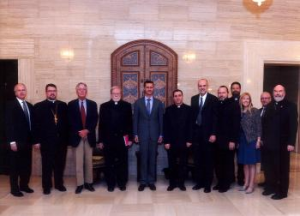 The following narrative is my own assessment of that experience, along with some account of what I learned.
The following narrative is my own assessment of that experience, along with some account of what I learned.
Let me begin by expressing a deep, sincere gratitude to Metropolitan Philip, both for the golden opportunity to visit Syria and for the confidence he placed in myself and the others he sent.
Most of this trip was devoted to matters not directly related to its purpose—namely, visits to shrines and other places of cultural interest. We began, in fact, by first paying our respects at the house of St. Ananias, the first bishop of Damascus, who baptized Saul of Tarsus. We also saw the window in the city wall, through which the Apostle was lowered in a basket. We walked many blocks along and around the “street called Straight,” passing through the Christian and Jewish sections of the city. (There are still 3,000 Jews in Syria, by the way, another of the minorities who find a secure home in that country.)
Also in Damascus (the world’s oldest, continually existing city) we spent some time at the National Archeological Museum, which displays many of the excavated articles (those not absconded in former times by the occupying French!) which reflect the very long and rich history of the region. Foremost among these, in my opinion was the entire 4th century synagogue from Dura Europos, on the Tigris River, uncovered in 1932. If we had seen nothing else, the sight of the frescoes on the walls of that synagogue would have made the entire trip more than worthwhile. I could have stayed in that museum for the whole time!
In addition to Damascus, our group was privileged to pray at the shrine and tomb of St. Thecla in the village of Maalula and to visit the monastery in Saydnaya, where we reverenced St. Luke’s icon of the Virgin Mary and her young Son.
Security
When my parishioners in Chicago learned that Metropolitan Philip was sending me as part of the delegation to Syria, their reaction was uniformly negative. Simply put, the people were concerned for my physical safety. I tried to reassure them that the Metropolitan would never send his priests into danger. I also mentioned that our new bishops-elect would be going to Syria later in the year for their episcopal consecration. That could not happen, if their safety was in doubt.
My argument, however, was to no avail. Parishioners pleaded with me—some with tears—“Don’t go, Father Pat!”
I recognized that my parishioners were taking their cue from the view popularized by CNN, FOX News, and other media outlets that have been, for months, promoting a general and irresponsible hysteria about Syria. As for myself, I was not the slightest bit concerned about safety.
Candor compels the confession, nonetheless, that at one point in the journey, I did feel just a wee bit unsafe: Our little group was conducted into a large room full of scary-looking people, where a security force of more than twenty husky uniformed officers met us, all of them carrying side arms, and several holding assault rifles. As we walked through their midst, this security force gave our group a suspicious once-over. It is worth mentioning that this scene took place in the boarding area in an airport. The city was Chicago.
From the moment we actually boarded our plane, however, and during the entire remainder of the trip—in Jordan and Syria—I did not see a single side arm on any person at all, and I saw only two rifles: one held by a guard in front of the Defense Ministry in Damascus, and the other by the man who opened the front gate for us at the Presidential Palace.
During our whole time in Syria, I saw not a single armed policeman, nor—except for that guard at the Defense Ministry—a single soldier. I saw only one military vehicle, and that was near the Defense Ministry.
The only other weapons I saw in Syria were the 10-inch batons used by the local police to direct the flow of traffic in Damascus. Indeed, the only moments of apprehension we felt in Syria were occasioned by extraordinary displays of spontaneity and boldness on the part of its cab drivers.
In Syria our delegation—together and singly—was permitted to walk wherever we wished and to ask any questions of anybody we wanted. There was only one restriction: the tourist agency, assigned to guide us, mentioned two cities where, out of concern for our safety, it could not take responsibility for us. This concern, they said, was prompted by patterns of violence among some of the “armed gangs and criminal elements” active in those cities—not the Syrian government.
Prior to traveling to Syria, I had checked out the web page of our State Department, where I was warned that travel in Syria was currently very dangerous. Normally I would take such warnings seriously.
Over many years, however, I have done a lot of foreign travel, so I also trust my instincts with respect to safety. Long ago I walked the dark streets of Athens during a period when there were riots and insurrections throughout Greece. That same year—just after the civil war in Cyprus—I roamed all over that island, which was policed by U.N. peacekeepers.
In Kosovo not long ago, again at night, I strolled from the south (Albanian) side of Mitrovica, across the bridge, to the north (Serbian) side—and back again—without incident. I have walked around, after dark, in the neighborhoods of numerous foreign cities, such as London, Paris, Milan, Istanbul, and Tel-Aviv. In 1973 I was at the Athens airport, when terrorists stormed the El-Al customer desk with grenades and machine guns. I believe I can recognize danger when I see it.
I also know what it feels like to move around in a police state. Last year, for instance, I spent a week in Guatemala, where there were guns galore on nearly every street. At the time, the murder statistics in Guatemala City were staggering. One of our group on the Syrian trip, Father Timothy Ferguson, had spent a year in Guatemala, during which he followed the murder reports in the newspaper; he told me that there were 87 women murdered in his immediate neighborhood during that year, but not a single person was ever arrested for those murders. As for myself, within five minutes of entering Guatemala City, I was aware of danger.
So, let me sum up my impression of security in Syria. On a security scale of 1-to-10, I would give Syria 9.7. Using that same scale, I would give Detroit 4, Philadelphia 6, and Disney World 8.5.
Greeting the President
When Metropolitan Philip sent our little delegation to visit Syria, he asked us to make an honest and polite inquiry about the current political situation in that country, especially with regard to its Christian minority. Our interview with President Assad of Syria was probably the centerpiece of that inquiry.
We met with the President for about 90 minutes in the early evening. As the appointed spokesman for our delegation, I endeavored to set the tone in my introductory statement:
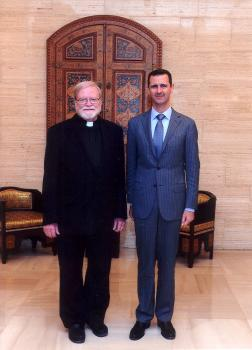
Fr. Reardon and Syrian President Bashar al-Assad
Mr. President, Bashar al-Assad, we are a delegation of American Christians, sent by Metropolitan Philip, our archbishop in the United States and Canada, as a renewed expression of his loyal friendship with you and his concern for the people of Syria.
Metropolitan Philip has charged us with the responsibility of learning—first-hand—your assessment of the political conditions in Syria.
Our mission here is likewise an expression of the concern of American Christians for the well-being of this beloved country of Syria, to which our debt is incalculable with respect to religion, history, and culture. To most of the members of this delegation, and certainly to myself, our visit to Damascus represents the dream of a lifetime.
To us, Syria is not just any country in the world. It is, rather, the hearth of our culture as Christians. To the extent that anyone in this room can be described as a cultured person, he is indebted to Syria.
Our journey to Damascus, therefore, expresses a return to the roots of our identity. Please, believe this declaration of our deep respect for Syria and our love for its people.
In the inquiries we humbly make of you today, we beg you to see both this respect and this love.
We bring you the warmest greeting of Metropolitan Philip, who holds your name and person in the highest honor, and we sincerely thank you for meeting with us.
I confess that our experience of the previous few days disposed us to think favorably of President Assad, right from the start. For example, the abbess at the Shrine of St. Thecla in Maalula, described his visit there this past Pascha. According to her, Dr. Assad drove his car, accompanied only by his wife—with no one else in attendance, neither security personnel nor press. They dined with the orphans who live near the shrine and are cared for by the nuns.
The couple spent the rest of the day with the orphans, who—the abbess said—look upon the President as a father. I think I speak for our whole delegation in remarking that the testimony of the abbess seemed very sincere and was most convincing. An identical impression was also conveyed to us, when we met with two Antiochian bishops at the Patriarchate the next day.
Such impressions were difficult to reconcile with the usual image of President Assad on American TV, where he is referred to as a murderer and “butcher.”
President Assad
After my greeting to President Assad, he invited us to ask any questions we wished, and he promised to be as open and frank as possible.
For our part, the delegation kept Metropolitan Philip’s directive in mind. Although he had not dictated or limited the scope of our inquiry, he had made clear what he did want: Information about the current internal order in Syria, particularly with respect to that country’s Christians.
Without exception, our group adhered to that focus. Consequently, we made no inquiries about Syrian foreign policy or its role in geopolitics. We never mentioned Syria’s relationship to Iran. We spoke not one word about Hezbollah, or Lebanon, or Israel. These subjects would have been distractions, so we stuck to the subject indicated by Metropolitan Philip.
As we entered the building, it was very instructive to observe the lack of security surrounding the executive leader of a nation. No one in our group was frisked or patted down, nor were we obliged to pass through a metal detector. We were simply escorted into the Presidential Palace and greeted at the door of the conference room by President Assad himself.
Dr. Assad, speaking excellent English, showed himself to be very cordial and personable. There was not the faintest suggestion of a maniacal dictator like Castro, Noriega, Hussein, or Ghadafi. This was a man of obvious culture, refinement, modesty, and gentility. Our meeting, which lasted nearly 90 minutes, was informal, candid, and unhurried.
The President said the economy—chiefly widespread poverty—was at the heart of the problem in Syria. He went on to declare, however, that the originally peaceful demonstrators were later infiltrated by right wing extremists, including the Muslim Brotherhood and a small very dangerous group from Iraq. He confessed that neither he nor his government was prepared for the violence that erupted so suddenly.
In response to a specific question on the subject, President Assad admitted that the military force over-reacted to this violence, on occasion, so that some demonstrators were killed and others tortured. These developments, he insisted, were contrary to his own policies. Other reported tortures, according to the President, were actually acts of revenge undertaken by emotional military personnel, who had lost colleagues during the demonstrations.
The President estimated that the demonstrators represented about 150 to 200 thousand people, out of a population of 23 million.
Syria’s greater problem, he believed, came from the portrayal of Syria conveyed in the Western media. The latter were allowed free range in the country in the first month of the uprisings, but when their depiction of the situation became unfair, distorted, and unbalanced, the government determined to send them packing.
The President believed the Syrian people were ready for reform, and he declared his intention to give it to them. He already started with educational and election reforms and made a start towards weeding out political corruption. Much more is planned, he said, but it takes time.
One of our questioners, persuaded that the Syrian government employed a large number of secret informants, make inquiry of President Assad on this point. He responded, “If I really had a large number of secret informants eavesdropping on the population, I don’t know how the strength of the uprising could take me by surprise. If we had a larger intelligence service, we would not need such a large army.”
In answer to a direct question from myself, President Assad insisted that no aircraft of any kind has been used against Syria’s demonstrators—a flat contradiction to TV reporting in the United States—and that no shots have been fired on the crowds from the tanks used as cover by Syrian soldiers under attack. (This was confirmed by Michel Kilo, a representative of Opposition, about whom I will write shortly.)
Our group was particularly interested in the President’s view of Syria’s Christian minority, which he believes is necessary in order to keep the country “secular.” (By this adjective, he explained, he meant a political setting in which no one religion can dictate to, or have advantage over, another.) Christianity has a moderating influence on Islam in Syria, he declared, and people are free to practice whatever religion they choose. “There can be no democracy in Syria,” said President Assad, “without Christians. A completely Muslim country would have not the counterbalance of influence necessary for democracy.”
Other Testimonies
In addition to our conversation with President Assad, our delegation also met with other important Syrians:
First among these were the two bishops who spent more than an hour with us at the cathedral office of the Antiochian Patriarchate. Both of them were very vocal about the current situation in Syria. Testifying that they had visited the sites where the reports of large-scale violence had taken place, they expressed a vehement protest against the inaccurate portrayal of their country in the Western news media. They claimed to have regular contact with their people in those communities, who insist that the local uprisings are blown completely out of proportion on American and European television.
These bishops also could not say enough positive things about the President, Bashar al Assad. We found this message to be a consistent and common theme from virtually everyone we talked with on the trip.
This was true even with respect to the “opposition figures” with whom we met. Chief and most outspoken among these was Michel Kilo, a representative of the Intellectual Party, who has consistently been a peaceful member of the opposition. A former Marxist, Kilo described himself as very pro-democracy but not necessarily anti-regime. In fact, he said, if President Assad is successful in introducing reforms, such as a fair and democratic election, he would vote for him!
Kilo acknowledged that there is much more than meets the eye with respect to the demonstrators, and he avowed that they do not all have the same agenda. He also believed the peaceful demonstrators’ agenda was being hi-jacked by extremists who, even among themselves, pursued other agendas, or none at all! Kilo called for an end to the violence on both sides and a faster pace toward needed reforms in the country, especially those dealing with corruption in the government.
On our last day in Damascus, we had an unexpected meeting with seven sheiks from northeast Syria (if memory serves), who learned of our presence in the country and journeyed to meet with us. These men, who represented 7 million Syrians, were dressed in the traditional garb common in Bedouin areas. They insisted on three points: (1) There is one God; (2) There is one Syria; and (3) There is one President Assad. These men, let me say, were in no mood to compromise!
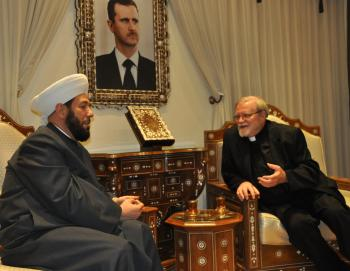
The Grand Mufti of Syria and Fr. Reardon
Our last meeting, which lasted until about three o’clock in the morning of our final day in Syria, was with the leading Islamic cleric in the country known as the Grand Mufti, the spiritual father of Syria’s 70% Sunni majority. We found him to be very charismatic, warm, and friendly. Indeed, he was so irenic that I caught myself fancying I was talking with a Hindu! He deplored violence of any kind and preached to us about the dignity of humanity whether Muslim, Christian, Jew, or otherwise.
The Grand Mufti was also very pro-Assad and criticized what he called the huge fabrication the Western media was advancing by using unverified You-Tube films in its reports. He had been at those locations, he declared, exactly when some of the alleged uprisings and violence were occurring, and he saw nothing to support the exaggerations of the Western press. The Grand Mufti speculated that there was a 90% approval rating for President Assad in Syria, compared to the current 39% approval for President Obama in the United States.
Conclusions and Speculations
Let me summarize my impressions of the political situation in Syria:
First, I can only form opinions on what we saw and heard which did not include the alleged “hot spots.” I specifically requested to be taken to one of these places, explaining that, as a normal Chicagoan, I am completely devoid of fear. Concerned about safety, however, they politely declined my request.
Second, given the fact Damascus is the capital and the most populous region of Syria, one imagines we would see at least a hint of a revolution if there really were one. We did not.
Third, Christians in Syria are safe and happy. They worship in freedom without oppression. Both before and after this trip, several friends suggested that Christian support for the government in Syria is an example of the “Stockholm Syndrome.” That is to say, they speculated that the Christians in Syria are identifying with their oppressors to the point of supporting them. Let me affirm categorically that this is not the case in Syria. Christians in that country are not an oppressed minority, as they are, for example, in Egypt. Muslims in Syria have no political advantage over Christians.
Fourth, the TV reporting on Syria in this country is anything but “fair and balanced.” With a view to correcting this problem, our delegation suggested to President Assad that he begin by inviting one well-trusted television reporter from the United States to sit and talk with him, much as we did. Our recommendation was specific; we named such a reporter, who happens to be Orthodox. The President said he would give it serious consideration.
Fifth, it is my impression (and I speak for myself alone) that the stability of Middle Eastern governments, including the Syrian, depends a great deal on the support of the military. For this reason, it is not unknown for the leaders of such countries to have only a limited authority over their military establishments. If this is the case in Syria, it would explain, at least in part, why President Assad has not been able to stop all violence from the government’s side, even though such violence is diametrically at odds with his own policies.
Sixth, unless I am dreadfully mistaken, the current Syrian government is in no immediate danger from an internal revolution. There is far more rioting in the United States, and in almost every country of Western Europe, than there is in Syria. Even as I write this, there are more demonstrators camping out on Wall Street (where they voice utter vacuities, at all hours, to the press corps) than there are anywhere in Syria.
More Recent Developments
Since our return from Syria, two related developments have come to my attention:
First, shortly after we left Syria, a journalist from the BBC, Lyce Doucet, filed a report called “Inside Damascus, a city on edge” (9/26/11). This title (surely chosen by someone else) disguises Doucet’s actual report, which is compatible with everything I have written above. The distress she found in Damascus was chiefly related to the city’s loss of tourism, the result of the bad press the county has endured through most of this year. As I commend Doucet’s carefully crafted account, I also would like to believe it represents a much-needed return to factual reporting about Syria in the Western press.
Second, there continue to be targeted assassinations of Syria’s cultural and religious leaders, such as Hassan Eid, a surgeon at Homs’ general hospital; Aws Abdel Karim Khalil, a nuclear engineering specialist and charge d’affaires at al-Baath University; Mohammad Ali Aqil, deputy dean of its architecture faculty; Nael Dakhil, director of the military petrochemical school; and Saria Hassoun, the young son of the Grand Mufti himself.
Of these recent victims of violence, Khalil and Eid belonged to the Alawite sect (to which President Assad also belongs), Aqil was a Shiite Muslim, Dakhil a Christian, and Hassoun a Sunni.
What did these men have in common? Two things: First, they were all supporters of President Assad. Second, their murders have gone almost unmentioned in the Western press. For the Western media to report such murders, after all, would undermine the biased impression it wants to convey about the nature of the disturbances in Syria.
A Final Word
As the chosen spokesman for our delegation while we were in Syria, it fell to me to give two television interviews while we were there, the first one for SANA (Syrian Arab News Agency) and the second for a private commercial channel.
My first interviewer, who was an Antiochian Orthodox Christian, began with the hope that I would consider Syria my “second home.” “No,” I replied, “Syria is my first home.” I went on to explain my regard for Syria, because it is the geographical and historical link between the cultures of the Fertile Crescent and the Mediterranean Basin. As such Syria is the capstone, the link that holds Western Civilization together. It was Syria—specifically Ras Shamra—that taught us the alphabet. Consequently, if anyone wants to disagree about his level of debt to Syria, I will insist that he communicates the disagreement in either cuneiform or hieroglyphics; he certainly has no right to use the alphabet. Syria is, in short, at the absolute root of who we are.
Let me end by expressing, once more, my profound gratitude to Metropolitan Philip, to our Syrian hosts, to all those who made this journey possible, and to everyone who prayed for us.
